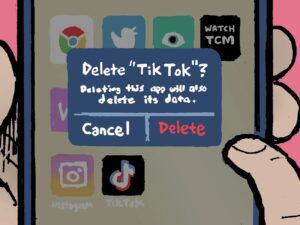The Daily News Roundup will return on Monday 12/1, as the AdExchanger team will be too stuffed with Thanksgiving turkey to get off the couch until then.
News You Can Use
DMG Media, the publisher of Daily Mail and other British news titles, is expanding into social monetization and agency services with the launch of a new media venture called, well, DMG New Media.
The company announced four senior additions from creative agencies and social content production companies who will lead the new “social-first publisher,” head of New Media Nick Moar tells Press Gazette.
The DMG New Media business includes 60 people, with expectations to crank out more than 100 social media videos per day. Videos will publish under the banners of Daily Mail or specialist brands that DMG operates, like The Spotlight in entertainment and The Respawn for gaming. The idea is to add more niche accounts that aren’t overtly Daily Mail products but are within the DMG network on the backend.
The New Media monetization comes via brand partnerships, such as this video sponsored by McDonald’s and published by the Daily Mail UK TikTok account, in which the Daily Mail’s usual TikTok narrator and creator takes on alleged conspiracies involving McD’s beef quality.
These are the measures publishers must go to, though, as search traffic and ad revenue dwindle.
Caveat Chef-tor
People often make fun of how long it takes to get to the ingredient list of an online recipe, but it’s a necessary evil where monetization is concerned.
In addition to the usual suspects (writing for SEO, making space for display ads, etc.), food bloggers also need to include recipe headnotes or photographs so they can properly copyright their work. Thus, all the long-winded introductions about why their family simply loves this dish.
But, according to Bloomberg, food bloggers are already seeing sharp decreases in web traffic and revenue this holiday season, much of which can be directly attributed to Google’s AI Overviews.
Some food publishers have also found altered versions of their work posted to MFA slop websites – such as the founders of Pinch of Yum, who discovered AI-generated images of themselves and their child on a German-language mirror of their site.
Worst of all, LLMs typically pull from multiple sources when generating new text, meaning the recipes they generate might not even be possible to make.
“No matter how clever the AI is,” Easy Peasy Foodie’s Eb Gargano said, “it can never actually test a recipe in a real kitchen and see how it works.”
Giving Up The Ghost
People love to post lies on social media. Charlie Brown had hoes? Not true. Honda is ghosting people after promising free cars? Also not true.
But that hasn’t stopped a TikTok trend dragging Honda and other brands for refusing to send allegedly aggrieved customers free stuff, The Wall Street Journal reports.
In a recent video, a TikTok user complained that Honda cut off communication after promising to replace her broken-down car. The poster eventually admitted she made it up for laughs. But the video caused a slew of TikTokers to demand Honda honor its nonexistent commitment.
It’s all part of the “ghosted” trend that’s swept TikTok in recent weeks.
The trend kicked off when another TikToker claimed Revlon promised to replace a product she lost, but failed to do so. However, in this case, Revlon apparently actually promised to replace the product. Sympathetic posters rallied to the original poster’s support, as Revlon’s rivals promised their own freebies.
After the Revlon squabble generated engagement and perks, other posters hopped on the bandwagon. The brands impacted vary from Southwest Airlines to Oatly and Domino’s.
Some brands are leaning into the controversy, which Monks SVP Casey Savio Samuels says is the right strategy. Whether the claims are true or not, she says, social media users really want to see how brands react and engage with their communities.
But Wait! There’s More!
NBC’s new sports network is now available on Comcast TV. [Variety]
Best Buy raises its full-year outlook, says consumers are still willing to pay for upgraded tech products. [WSJ]
Meanwhile, Bath & Body Works lowers its full-year outlook, says consumers aren’t willing to buy laundry detergent from the soaps and candles brand. [WSJ]
An AI search startup says it’s spotted the first ads appearing in Google’s AI Overviews. [Performance Marketing World]
OpenAI and Perplexity are launching AI shopping assistants, but their smaller competitors don’t seem too worried. [TechCrunch]
How two startup founders pretended their company was AI-powered to validate their product idea before actually developing it. [Business Insider]
The ultimate problem with LLMs: Language is not the same thing as thought. [The Verge]
Is the era of robot-driven unemployment upon us? [Fortune]
Thirty-five state attorneys general signed a letter asking Congress not to block state laws regulating AI. [Reuters]
Spotify will increase its prices in Q1 of next year, possibly at the behest of major record labels. [TechCrunch]
Thanks for reading AdExchanger’s Daily News Roundup. Want it by email? Sign up here.














